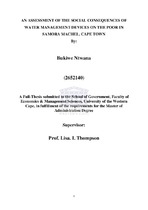An assessment of the social consequences of water management devices on the poor in Samora Machel, Cape Town
Abstract
This study assesses the social consequences of water management devices in poor households in Samora Machel, a poor urban area characterised by high levels of unemployment and poverty. South Africa is currently faced with an increase in the roll out of water management technologies, mainly in poor areas, allegedly to manage water demand and help poor households manage their water consumption and prevent wastage. The water management device (WMD) limits access to the free basic water (FBW) allocation and automatically cuts it off when the allocation is finished. In 2009/2010 the City of Cape Town started rolling out the devices in Samora Machel, which previously used the conventional water meter that supplied the area with unlimited water access. WMDs limit water access to 350 litres of FBW per day. People living in Samora Machel claim that 350 litres is not enough and they are experiencing problems of frequent water cuts even before the allocated litres are used up. There have also been water leaks ever since the installation of the devices. Section 27(1)(b) of the Constitution of the Republic of South Africa, Act 108 of 1996, entrenches the right of access to sufficient water. The WMDs are criticised for infringing the right of access to sufficient water supply to poor households by leaking, cutting off water supply frequently and by limiting access to FBW supply. Moreover, critics argue that the WMDs are not water-demand management mechanisms; they are cost-recovery mechanisms that are introduced under the neo-liberal policies introduced by the post-apartheid government in 1994. This criticism is based on the fact that the WMDs are implemented in poor areas only, where water is needed more for basic survival, rather than in high-income areas, where water is mostly used for luxury purposes.

